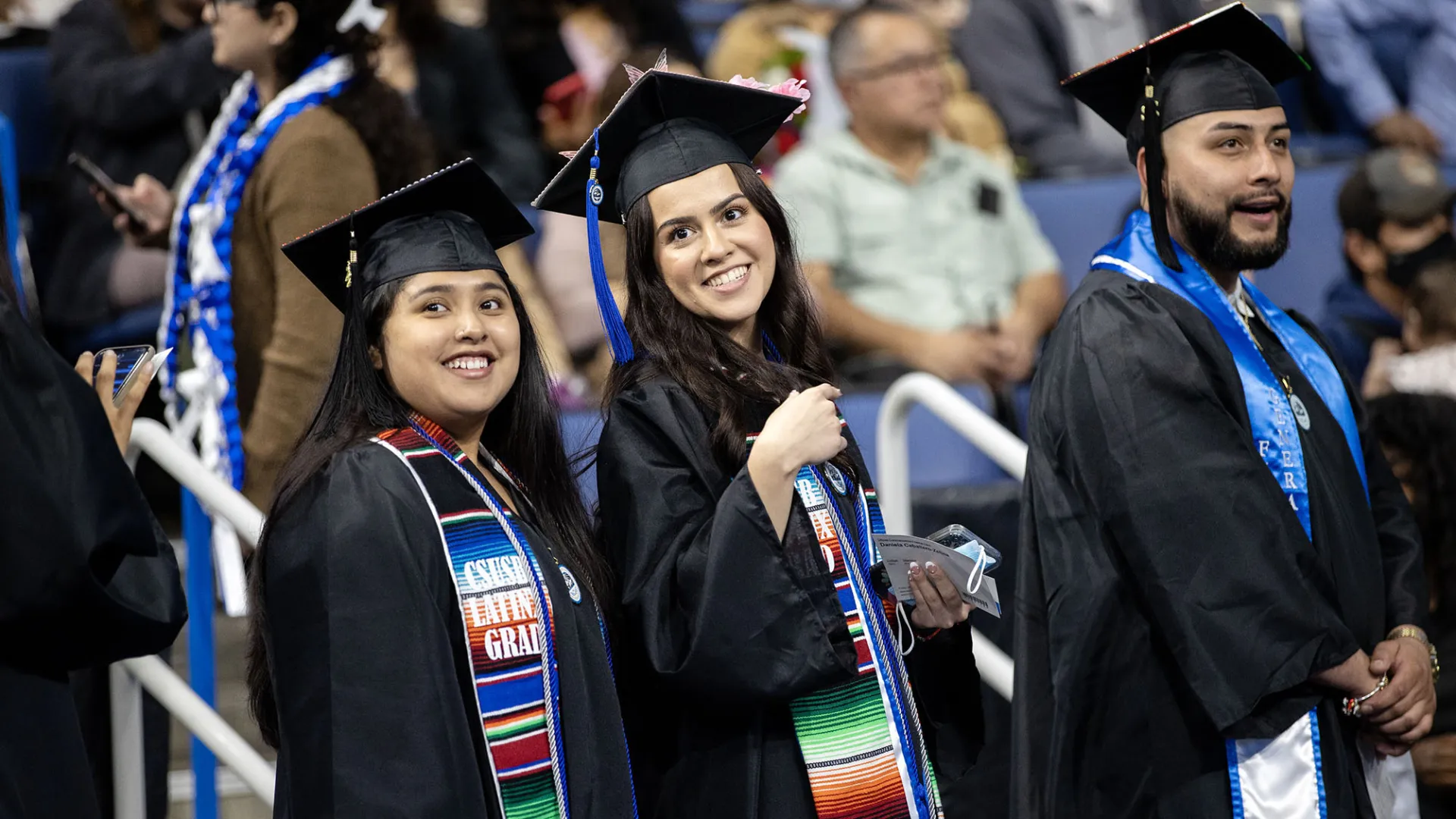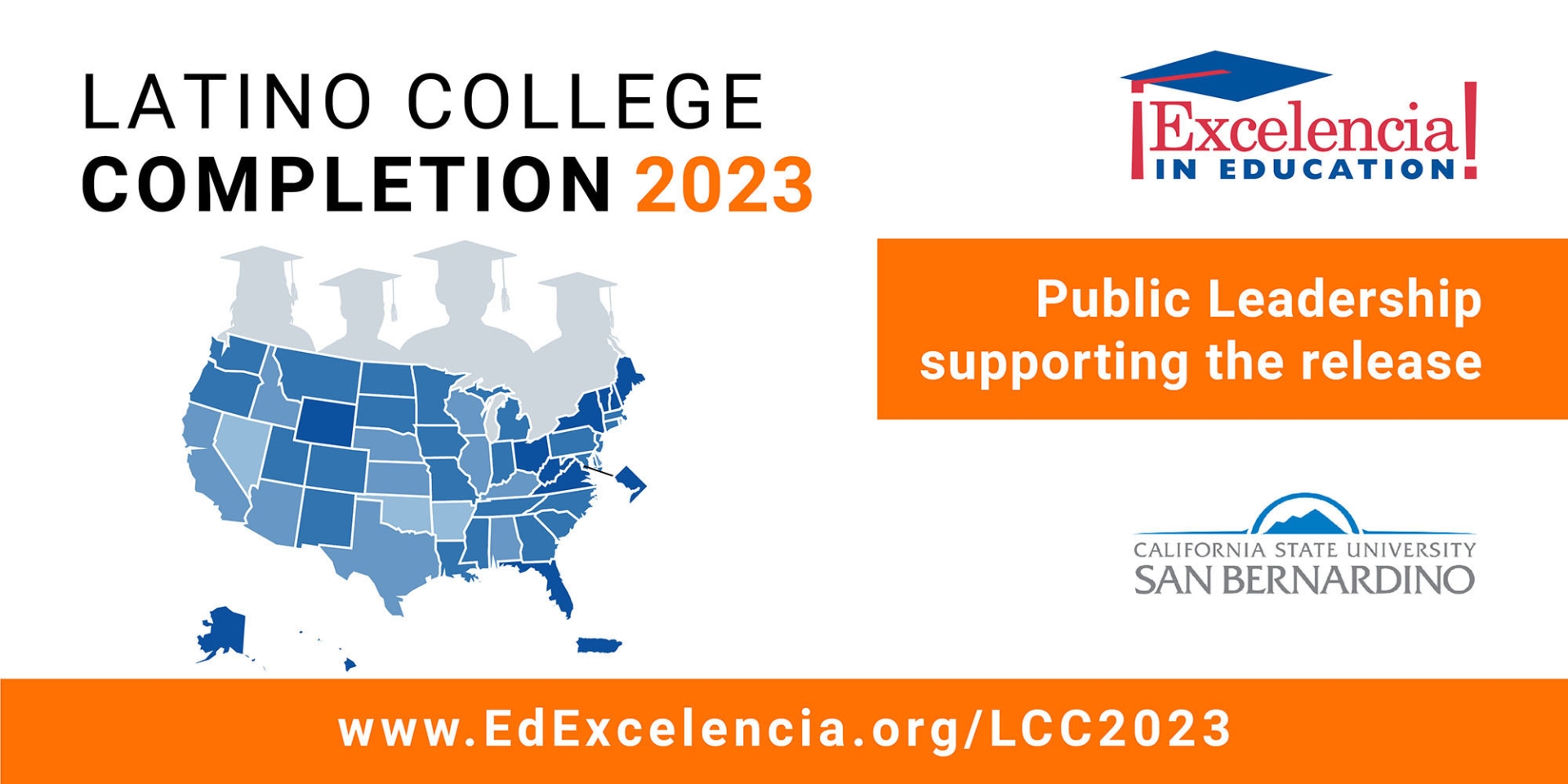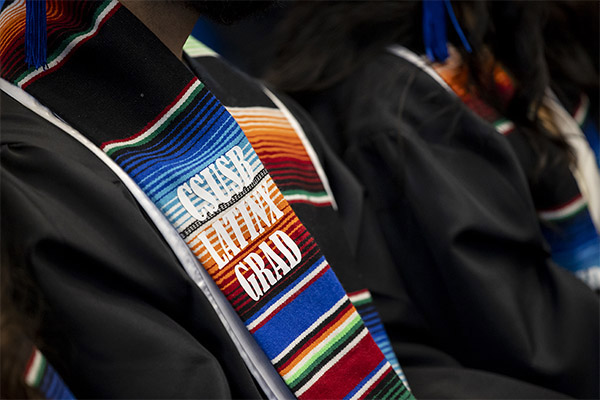Alan Llavore | Office of Strategic Communication | (909) 537-5007 | allavore@csusb.edu


An analysis by Excelencia in Education, the nation’s premier authority in efforts accelerating Latino student success in higher education, has placed Cal State San Bernardino among the state’s and nation’s top higher education institutions enrolling and graduating Latino students.
CSUSB is 11th in Latino student enrollment and ninth in awarding baccalaureate degrees in California, and 33rd in enrollment and 19th in awarding baccalaureate degrees nationally. Two other California State University campuses also were included: Cal State Northridge is first in the state and third nationally, and Cal State Fullerton is second in the state and fourth nationally.
“As we celebrate our achievements in Latino student enrollment and baccalaureate degree awards, we are reminded of the transformative power of education,” said Tomás D. Morales, president of Cal State San Bernardino and a partner with Excelencia to bring new analysis on Latino college completion and enrollment trends across the United States to the public. CSUSB is one of 25 institutions across the country supporting timely analysis on Latino students.
“CSUSB’s faculty and staff are dedicated to engaging, enrolling and graduating today’s students, who represent the vibrant Latino community,” said Morales, who is a member of Excelencia’s national Presidents for Latino Student Success network, comprised of institutional leaders who have committed to making their institutions learning environments where Latino students thrive. “They are not just statistics. They are the future human capital that will drive our workforce and shape our civic society. Their success is not only vital for their personal growth but also crucial for ensuring America’s future prosperity.”
The analysis, “Latino College Completion: United States 2023,” published on July 19, is the most comprehensive, up-to-date information available on Latino enrollment and graduation rates as well as programs proven to work for Latinos at the institutional, national and state levels. The analysis reveals that the degree completion gap between Latino and White students has increased in the last four years (2018-2021). At two-year institutions, the gap increased from two to five percentage points, and at four-year institutions, it increased from 12 to 13 percentage points.

“Despite recent questions about the value of a college degree, we are proof that a college degree makes a positive difference in the lives of individuals, society and our country,” said Deborah Santiago, Excelencia in Education co-founder and CEO. “The data confirm that a national tactical plan must be implemented to intentionally serve Latino students to accelerate their degree completion while all communities increase.”
It is impossible for the U.S. to meet its goal of having an educated workforce without accelerating Latino college completion given the Latino population’s youth, growth, and yet lower educational attainment levels than those of other segments of the population. Just 30% of Latino adults 25 years of age and older had earned an associate degree or higher in 2022, compared to 53% of White, non-Hispanic, 39% of Black, and 66% of Asian adults.
“Our country will thrive if we intentionally serve Latino students while serving all,” said Sarita Brown, Excelencia in Education co-founder and president.
Key findings from the analysis include:
- Degree completion gaps between Latino and White students have increased in the last four years (2018-2021). Since 2018, the graduation rate for White, non- Hispanics has increased at both two-year institutions (from 35% to 38%) and four- year institutions (from 63% to 65%). In comparison, the rate for Latinos has not changed at two-year institutions (33%) and has increased slightly at four-year institutions (from 51% to 52%).
- Latino students are more likely to no longer be enrolled in college than their White peers. At two-year institutions, 45% of Latino students were no longer enrolled at any institution after three years compared to 38% of White, non-Hispanic students in 2021. At four-year institutions, 31% of Latino students were no longer enrolled at any institution after six years compared to 20% of White, non-Hispanic students in 2021.
- While Latinos’ degree attainment has grown overall, it is still significantly lower than that of White, non-Hispanics. Over the last ten years (2011-2021), Hispanic adults’ degree attainment has increased from 20% to 28%. However, the gap in educational attainment between Hispanic (28%) and White, non-Hispanic adults (48%) is significant — 20%.
- Latino representation among students continues to grow in every state. In almost every state, the representation of Latinos enrolled in K-12 education was higher than the representation of Latinos overall. Nationally, one in four students in K- 12 and one in five students enrolled in higher education are Latino. However, outcomes in states and in institutions where they are located vary and create opportunities for more intentional action.
- Nationally, the top institutions enrolling and awarding degrees to Latinos are concentrated geographically. While Latinos are in every state, the top three states in terms of Latino population are California, Texas and Florida. Four of the top five institutions enrolling Latino students are in Florida and Texas. California institutions are only two of the top five institutions awarding bachelor’s degrees to Latinos.
- Colleges and universities in Excelencia’s national network of Presidents for Latino Student Success (P4LSS), which includes CSUSB, lead the nation in enrolling and graduating Latinos. Four of the top five institutions enrolling Latinos and all of the top five institutions awarding associate and bachelor’s degrees to Latinos in the country are in the P4LSS network. In addition, four of the top five institutions awarding bachelor’s degrees to Latinos have earned the Seal of Excelencia, a national certification for intentionally serving Latino students.
“We are proud to work with a national network of forward-thinking institutional leaders who are demonstrating what is possible when it comes to accelerating Latino student success in higher education,” Brown said. “Each has made common cause with Excelencia by committing to transforming their institutions to become places where Latino students thrive. In doing so, they are ensuring America’s future.”

The colleges and universities in Excelencia’s network are transforming higher education. Of the thousands of colleges and universities across the country, Excelencia’s Presidents for Latino Student Success network represents 4% of America’s colleges and universities yet, in 2022, enrolled 31% and graduated 33% of all Latinos students. Further, 30 institutions within the network have earned the Seal of Excelencia for demonstrating, through data, practice and leadership, how they intentionally serve Latino students while serving all.
Excelencia professionals and the colleges and universities in the network work in common cause to put evidence-based practices, research and strategic analysis of student data to use supporting and advancing the talents, skills and contributions of Latino students and the institutions.
Through the partnership, Morales and the other public leaders continue to collaborate with Excelencia to leverage collective expertise and resources and foster working relationships that amplify current efforts and impact the national level.
“Together,” Morales said, “let us continue to empower these students, harnessing their potential to create a brighter and more inclusive tomorrow.”
About Excelencia in Education
Excelencia in Education accelerates Latino student success in higher education by promoting Latino student achievement, conducting analysis to inform educational policies, advancing institutional practices, and collaborating with those committed and ready to meet the mission. Launched in 2004 in the nation’s capital, Excelencia has established a network of results-oriented educators and policymakers to address the U.S. economy’s needs for a highly educated workforce and engaged civic leaders.